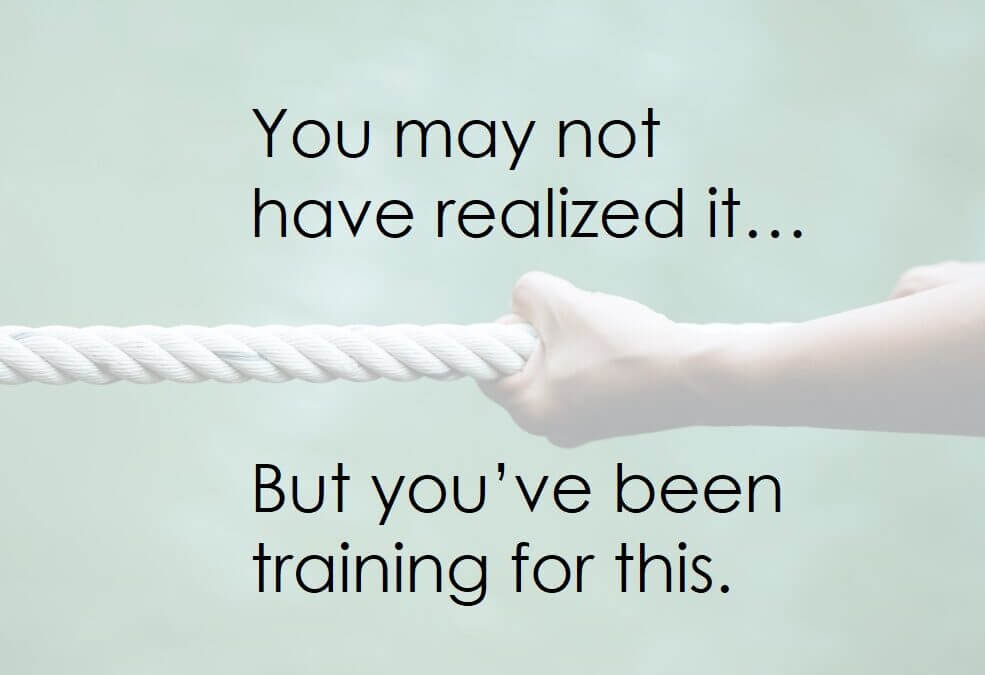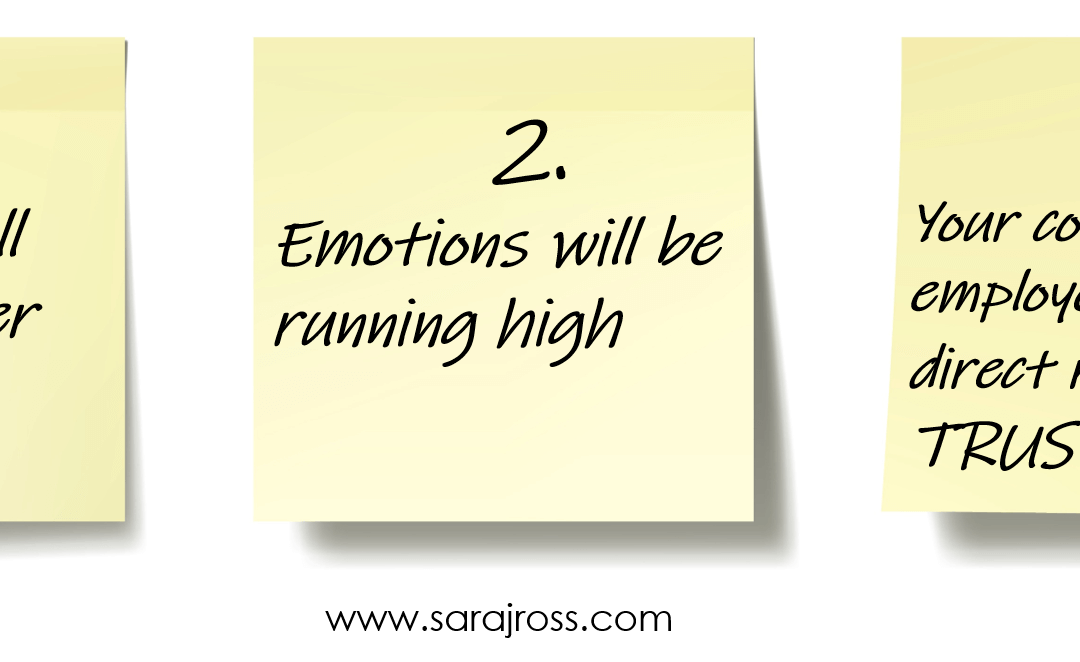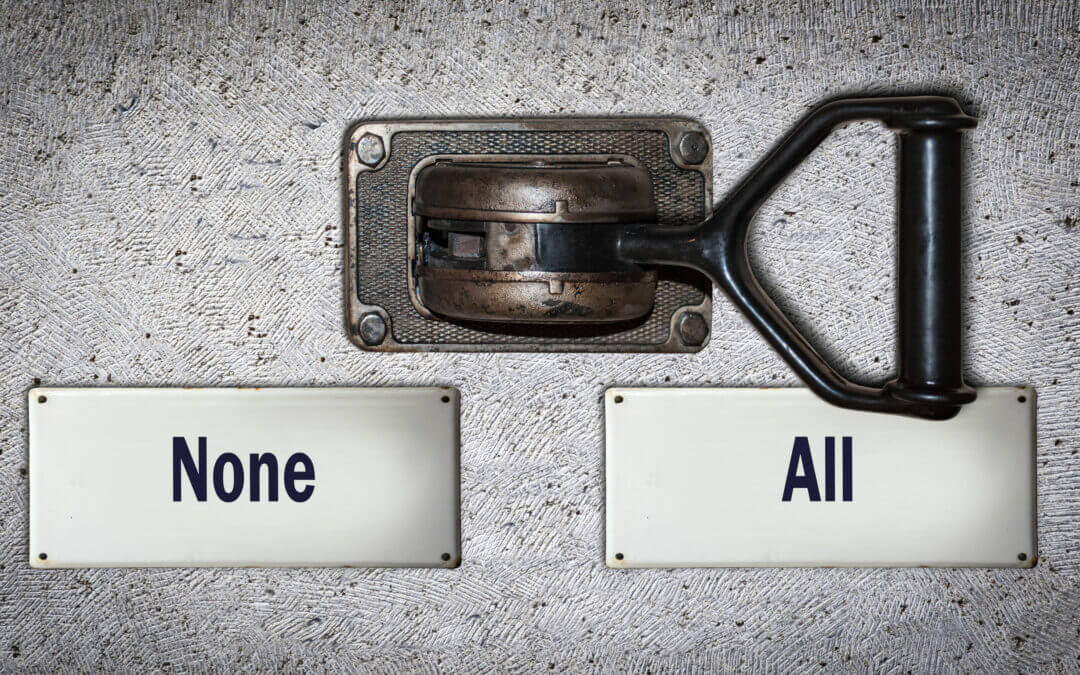
by Sara Ross | Mar 23, 2020 | COVID-19, Personal Leadership, Resilience
It’s the start of another week in the midst of COVID-19. I suspect it will feel different, but that doesn’t mean it will be any easier.
This might sound counter-intuitive, but I’d like to ask you to start by doing something difficult.
I ‘d like you to reflect on one of the hardest events in your life (outside of the current situation), where the outcome wasn’t what you wanted.
Knowing what you know now, and accepting that you can’t change the outcome, what would have helped you better cope with that situation?
Now, write down how can you apply that wisdom today.
In 2016, my mother died from breast cancer. When her cancer came back, it rapidly spread throughout her body. I spent the first couple of weeks obsessively trying to figure out how long she would live.
I felt that if I had this answer, I could make the best decisions around her comfort and treatment, when to notify family and friends, how much time I would need to take off work etc.
I believed that I could handle everything, if I just knew when my mothers death was coming.
I’ll give you one guess what my learning was?
I can’t predict, control, or force the future to unfold as I would like, not matter how hard I try.
I needed to increase my uncertainty tolerance and move on not knowing.
I needed to learn to make decisions on incomplete information.
I had to accept some decisions were right and some were wrong.
I had to learn to trust that I was doing my very best, with the resources I had in my most difficult moment.
I did get there, but I was overwhelmed, heartbroken and mentally, emotionally and physically drained by the time I got there.
Today, with my entire business future uncertain, I have experienced the same emotions. The good news is, I went through that phase much more quickly this time. I am more comfortable sitting with uncertainty and trusting myself.
Don’t get me wrong, I want answers about when the pandemic will end, I want certainty in what the world will look like, and I’d love to know I am making the right decisions at the moment…but I feel like I’ve been training for this.
I suspect you have as well!

by Sara Ross | Mar 15, 2020 | COVID-19, Culture, Leadership Vitality, Management, Managing Pressure, Personal Leadership, Stress, Teamwork
How to handle COVID-19 working from home.
With all of the uncertainty everyone is facing, there are three guarantees that you should expect :
1. Everything will take longer. Conferencing everyone in, trying to call into a customer service center, or waiting in line at the grocery store, expect everything to take longer.
2. Emotions will be running high. Everyone is facing uncertainty, but each person’s circumstances are different. It serves us to remember that as empathy is often the first causality in stressful situations. Even if you can’t see emotions, they are there and will influence people’s effectiveness and productivity, hence point number one.
3. Your colleagues, employees, and direct reports are TRUSTWORTHY. Please don’t make people earn your trust – start by giving it. Even if you can’t see them at their desk, even if they don’t respond immediately to your email, assume that points one and two are contributing to any delays, not that they are slacking off, untrustworthy, and lacking commitment.
It’s natural when dealing with sudden change and uncertainty for our brain to look for shortcuts via assumptions and expectations.
Shift these positively to strengthen relationships and help people be at their best.
We owe that to one another.

by Sara Ross | Jan 23, 2020 | Gratitude, Personal Leadership
I can fall into the all-or-nothing trap, anybody else?
It’s certainly not a quality that I am proud of admitting. It can show up in multiple forms but there is a particular ‘all-or-nothing’ scenario that I’ve really been working on changing. It comes in the form of appreciation.
More frequently then I’d like to acknowledge, I have found myself considering a gesture I could do for someone that I know they would appreciate. The reason I am even thinking about it is because I want this person to know how much I care for them.
And then for various reasons, some legitimate and some not, I find myself not following through on the grand gesture…or any gesture. All-or-nothing.
To make myself feel better, I will rationalize my inaction with the justification that a smaller demonstration of appreciation would not adequately show how much I care for them – and I can’t risk that!
But a recent experience following a week of very challenging work travel has helped me start changing this thinking.
I should start by sharing that I am very lucky to do a lot of travel for my work. I love it.
However, the less loved side of travel includes all the inevitable aspects; cancelled flights, missed connections and frequent delays, all of which often have me landing far later than originally planned.
This was exactly the case following one of my final flights last year. As I alluded to above, it was a heavy and challenging week of travel that started by flying out Sunday afternoon. I had planned to fly home Tuesday evening, spend time with my family and then fly back out the following day. As often occurs in the winter months, Mother Nature had a different plan.
Due to storms, I was forced to shift my flight home and instead go directly to my next keynote. After finishing my talk, my final flight home was again delayed. The same storm, which seemed to have been following me airport to airport the entire week, was now hitting Toronto. Luckily it was the tail end and the flight was eventually able to depart, unfortunately, it was six and a half hours later than originally scheduled.
As a result, it was close to 1:30 AM by the time I walked in the door. Being so late, I knew my husband would be asleep.
Yes, I was disappointed that I wouldn’t get to chat with him after being away all week, but admittedly I was tired and just wanted to go to sleep. What was more disheartening was the anticipation of a cold house waiting for me once I arrived home.
I knew this because my husband can only sleep if the temperature is low – and by low, I mean cold.
I, on the other hand, always seem to have a chill and do not enjoy being cold, let alone sleeping in the cold. We’ve had the cliché argument about the temperature in our house from the moment we moved in together. (Side Note: he has a good argument, I can put on a sweater, but he can’t take off skin).
To compromise, I bought a small heating blanket last year. The ROI on this purchase has been unmeasurably positive. About 30 minutes before bed I turn it on so by the time I crawl under the covers my side of the bed is nice and warm.
However, being so delayed meant that I would be clambering into a cold bed (please note, I fully appreciate that this is not a life hardship). So, it was not surprising that the temperature in the house had hit its nighttime low by the time I got home. Resigned to the fact that cold blankets were awaiting me, I dropped my suitcase at the front door and headed straight to bed.
But to my delighted surprise, as I lifted the covers I was met with a warm bed!
My husband had very thoughtfully and kindly, turned on my heating blanket for me before going to sleep.
To be clear, all this gesture would have taken was for him a reach across the bed and hit the “on” button – a small action, but one with a massively positive impact that made me feel very loved by him and made being home even more special.
On top of all of that, and perhaps even more importantly, it was proof:
A small action taken will always beat a grand gesture considered.
My learning was to not underestimate the impact of a heating blanket moment.
The next time you catch yourself heading towards all-or-nothing thinking, shift your thinking to small-and-something and ask yourself, whose world could you warm today with a small action?

by Sara Ross | Jan 10, 2020 | Personal Leadership
How to design a year to show up for yourself and others.
“I
should have taken today off; it’s been a tough day…it’s always a tough day.”
This was a conversation I was having with a client late last year. It had been
three years since his wife’s passing and the day of our discussion would have
been her 49th birthday. Before I could even ask my next question as to why he
hadn’t, he followed-up by explaining that he had too many meetings booked to
take the day off.
It
was what he said next that highlighted the real problem “Hopefully, next year
will be different.”
My
client is a successful and busy leader. As an important decision maker working
in a fast-paced, sales-driven organization, the chances are high that by the
time the date nears next year his calendar will again be filled with meetings.
Chances are even higher that his sense of obligation as a leader will keep him
from cancelling those meetings and prioritizing this day for himself.
The
reality is that without taking proactive action to block off that day for
himself, the outcome will not change.
This
situation is not unique to my client. It’s a common pattern I’ve witnessed,
especially with well-intentioned and often over-extended leaders. They allow their calendars to be driven by other people’s
priorities adding their own as an afterthought.
The
consequences are as predictable as they are frustrating. Not only does this
reactionary approach lead to regret, resentment and stress, but to quote John
Danahoe, the former CEO of eBay:
“The
world will shape you if you let it. To live the life you desire, you must make
conscious choices.”
Our
choices are demonstrated through our actions. Speaking with my client that day
I was reminded of how often I personally have reacted to similar situations by
waving my white flag, surrendering to the busyness. After missing too many
important events and disappointing both myself and the people I care the most
about, I created a simple annual exercise to proactively design a blueprint for
the year ahead.
Over
the past couple of years, I have shared this with friends, family and leaders
to help them build capacity, foster vitality and ensure the things most
important to them take precedence over
other people’s agendas for them.
This
exercise requires only three things: access to your calendar or schedule –
professional and personal, something to capture your reflections, and one hour
of undisturbed time. I love to hit a coffee shop, turn off my Wi-Fi and turn on
my favorite playlist with a tasty drink for this annual ritual.
Start
by Looking Back at the Previous Year
Use
the first 30 minutes to look through the previous year’s calendars reviewing
both your past personal and professional priorities and commitments. Looking
week by week, record observations from the following categories:
- Specific dates and activities that were scheduled into your calendar that you’d like to make time for in the future. These could include birthdays, anniversaries, personal and professional events, traditions and experiences.
- Specific dates or activities that you weren’t available for or that weren’t scheduled (and perhaps missed), that you’d like to make space for in the coming year.
- Vacation time, specifically recording how much and when it was taken.
- With as much detail as possible, any additional time you took off that was either unscheduled or scheduled last minute. This could include sick days, mental health days, caregiver days, time-off for personal appointments or any other unexpected emergencies.
To
close off the first part of the exercise, take a mental step back and record
any trends that you notice. This is not meant for you to judge or beat yourself
up, but instead build awareness of what worked and what didn’t, when you felt
energized and when you felt drained, what you want more of and what you need
less of moving forward.
Perhaps
you’ll notice decisions that were made from a sense of obligation to others or
based on the opinions of others, as was the case with my client. Consider where
your personal expectations and values have positively or negatively influenced
your choices.
To
deepen this reflection, imagine a stranger looking through your recorded
observations; what might they think are your values and priorities? This
distancing perspective often helps you see things with less emotion and more
openness.
Now Look
Forward at the Year Ahead
For
the next 30 minutes focus on the year ahead of you. Building from your recorded
insights and reflections, take action to transform hopes into reality by
designing your future.
- Begin by building from your previous year in review. Start by transferring all the important dates into your calendar. If they are recurring, simply set them up to repeat year after year.
- Consolidate a list of things that you’d like to make time for in the following year that may not have specific dates yet. Reflect both professional and personally. These may be general, such as attending a large industry conference, going to an outdoor music concert, or taking your kids camping for the first time. Add in reminders or placeholders for these events now.
- Shift to focusing on vacation and personal time. Whether you have designated paid vacation days, or you are self-employed, everyone needs some dedicated, work-free regenerative time. In today’s 24/7 connected world, there may not ever be an ideal time to book a vacation or take personal time off. Wherever possible, officially schedule it your calendar or, at a minimum, tentatively block it. Much like my client, there will always be meetings and projects that will fill the calendar squeezing out your vacation time if you wait. Be proactive and make it a priority
To
close the exercise, repeat the same general reflections as you did in the first
30 minutes and record how you feel as you notice trends for the year in front
of you.
Take
the strangers perspective – have you designed a future that reflects a
fulfilling personal and professional life?
After
our call, my client went through this exercise. With his permission, this is a
part of what he shared:
“Directly
after our call I blocked my wife’s birthday for next year as a vacation day.
Now nothing can be booked over it. I plan to spend the day hiking which was
something we loved doing together. Giving myself this permission and taking
action has been incredibly empowering. Even more than that, I realized how
important it is for me to be of service to others. Looking at the past year it
became so clear that I was giving all of my energy away by trying to be
available to everyone, every day. I am redefining what being “of service” means
to me and looks like in my actions. I have scheduled time to share this with
others both at work and personally.”
Remember,
your priories come to light through your choices, but they come to life through
your actions.




